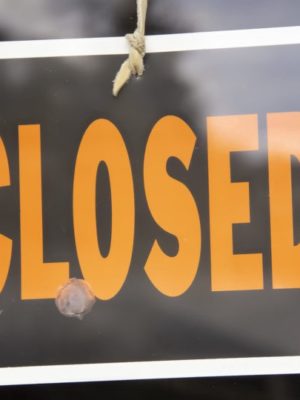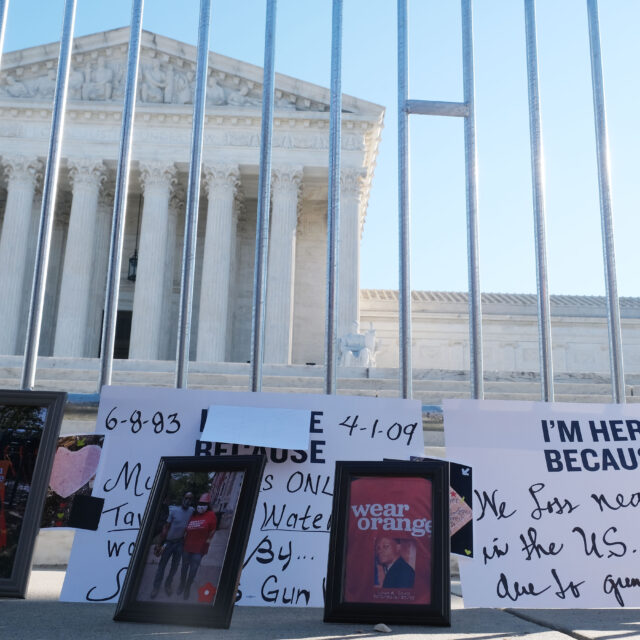When it Comes to COVID-19 Business Closure Orders, Courts are Getting it Right: Gun Stores are Not Entitled to Special Treatment

4.28.2020
The fight over whether the Second Amendment requires that gun stores be exempted from generally-applicable COVID-19 business closure orders rages on. In over a dozen lawsuits filed in states from coast to coast, the NRA and others continue to insist that they are entitled to extraordinary, emergency relief to override states’ and localities’ public-health judgments and open gun stores immediately.
We laid out our thinking on this constitutional question in an earlier post, focusing on the Supreme Court’s jurisprudence upholding neutral and generally applicable laws that — like the current business closure orders — only incidentally burden constitutionally-protected conduct. Under that doctrine, we explained, courts should find that including gun stores within neutral and generally-applicable business closure orders is entirely constitutional.
This follow-up post provides a number of updates and expands on our analysis with additional grounds that reinforce the arguments for finding that including gun stores in broad business closure orders is constitutional.
- On March 31, a federal judge in Ventura County, California denied plaintiffs’ request for emergency relief, concluding that they were unlikely to prevail on their Second Amendment claim. As the court explained, the “County Order does not specifically target handgun ownership, does not prohibit the ownership of a handgun outright, and is temporary.” In addition, the Court explained that “mitigation of the spread of the COVID-19 virus is a compelling interest,” and the business closure order involved complex decisions by the County “which are entitled to deference.”
- On April 6, a federal judge in Los Angeles reached the same conclusion under the Second Amendment for many of the same reasons, and likewise denied the requested emergency relief.
- Then, on April 10, a federal judge in northern California denied emergency relief on the ground that the plaintiffs had revealed the absence of any true urgency by delaying a request for that relief.
- On April 14, a state court judge in California rejected another request for emergency relief against the Los Angeles business closure order, dismissing arguments that the order was preempted by state law or violated constitutional due process. In this ruling, the court found that the “Safer at Home order . . . imposes broad restrictions on many busy sectors and does not ‘target’ gun sales,” the “Mayor could reasonably differentiate between gun dealers (and other non-exempt businesses) and the permitted ‘essential activities,’” and the plaintiffs would not be “irreparably harmed by having to wait to obtain their firearm or reinitiate sales at another outlet outside the City.”
These courts reached the right results: temporarily closing gun stores (along with thousands of other businesses) does not violate the Constitution under the current public health emergency. Which brings us to some additional points that further support this conclusion and may be important to courts’ expanded analyses as these and other gun-store closure lawsuits continue to move forward (including additional cases moving forward in Massachusetts, New York, and New Mexico).
First, many judges across the country considering a wide range of legal challenges to COVID-19 business closure orders have looked to Jacobson v. Massachusetts, 197 U.S. 11 (1905). In that case, the Supreme Court upheld the constitutionality of mandatory vaccinations imposed in the face of a smallpox outbreak. It emphasized that “[i]t is no part of the function of a court” to decide which mode of prevention is “likely to be the most effective for the protection of the public against disease,” id. at 30, and concluded that judicial intervention would only be appropriate if a law had “no real or substantial relation” to the protection of public health or was “beyond question, in palpable conflict with the Constitution.” Id. at 31. Following Jacobson, the Supreme Court noted that a parent “cannot claim freedom from compulsory vaccination for the child” and that the “right to practice religion freely does not include liberty to expose the community or the child to communicable disease or the latter to ill health or death.”
Several of Jacobson’s insights are directly applicable to the gun store closure challenges over a century later. As one federal appeals court has recognized, Jacobson and its progeny are “consonant with” the Supreme Court’s jurisprudence on neutral and generally-applicable laws that we focused on in our previous post. Stated differently, the neutral and generally-applicable nature of compulsory vaccination laws, and the fact that they serve the highest public interest of protecting the community from communicable disease, are central to the finding that they do not violate the Constitution. The same result logically follows for the current neutral and generally-applicable business closure orders, notwithstanding their inclusion of bookstores, gun stores, and other businesses and organizations connected to constitutional rights.
Second, Jacobson is important for another reason: it supplements the generally-applicable analysis by clarifying the deference public health authorities should receive in determining how to approach containing the virus — and thus in analyzing whether the challenged orders are, in fact, neutral and generally applicable. As noted above, Jacobson recognized that lawmakers — be it the legislative branch or, when issuing emergency orders pursuant to statutory powers, the executive branch — are better situated than courts to determine how best to address matters of public health and welfare.
In fact, the United States Department of Justice has endorsed Jacobson deference in a Statement of Interest recently filed in a case challenging COVID-19-related suspension of drive-in church services. As the Department of Justice explained:
- “Courts owe substantial deference to government actions, particularly when exercised by states and localities under their police powers during a bona fide emergency” (emphasis added).
- In particular, a court “must be appropriately deferential to the expertise of public health officials in evaluating potential distinctions” between excluded and permitted activities (emphasis added).
Jacobson, in short, reinforces the argument that the current neutral and generally-applicable business closure orders should be found to be constitutional as applied to gun stores among the thousands of other retail businesses, without the courts having to delve into either the fact that certain other businesses have been designated “essential” and left open, or the extent of the orders’ incidental impact on gun owners or prospective gun owners. Cf. Church of the Lukumi Babalu Aye v. City of Hialeah, 508 U.S. 520, 542 (1993) (“All laws are selective to some extent.”); Zucht v. King, 260 U.S. 174, 176–77, 43 S. Ct. 24, 25 (1922) (“A long line of decisions by this Court had also settled that in the exercise of the police power reasonable classification may be freely applied and that regulation is not violative of the equal protection clause merely because it is not all-embracing.”); Storman’s Inc. v. Selecky, 586 F.3d 1109, 1134 (9th Cir. 2009) (finding that “narrow” exemptions in a law requiring pharmacies to deliver medications were “a reasonable part of the regulation of pharmacy practice, and their inclusion in the statute does not undermine the general applicability of the new rules”).
Two further points bear emphasis. First, at least fourteen states have on the books emergency powers laws specifically allowing for gun sales to be suspended during a state of emergency. (*These state laws are cited below.) The prevalence of these laws in diverse states all across the country shows a broad understanding that, like other rights, the Second Amendment is not an insuperable barrier to the need to protect public safety during a state of emergency.
Second, to the extent that courts deciding these gun store closure challenges conclude that the Second Amendment is sufficiently implicated that the widely accepted two-step Second Amendment analysis should be conducted, the orders should at most be subject to intermediate scrutiny — a standard that the COVID-19 business closure orders easily satisfy, as the preliminary decisions in California referenced above have already found.
In determining the appropriate level of scrutiny to apply at step two in Second Amendment challenges, courts generally analyze the burden the restriction places on the core Second Amendment right recognized in Heller: having a firearm for self-defense in the home. In the context of COVID-19 business closure order challenges, this requires careful consideration of the individual or organizational plaintiffs’ circumstances, the specifics of the challenged orders, and the regulatory framework in the relevant jurisdiction:
- All of the business closure orders are temporary measures intended to limit in-person contact and “flatten the curve” of infections; as such, they impose a far lesser burden than a permanent prohibition, as several of the decisions referenced above recognized. Similarly, as one federal appeals court succinctly explained in a leading decision upholding the federal prohibition on handgun purchases by those under age 21, “[t]he temporary nature of the burden reduces its severity,” and supports applying “an ‘intermediate’ level of scrutiny.”
- None of the business closure orders addresses — much less prohibits — possession or ownership of firearms. The burden on an individual plaintiff who already owns or possesses a gun will therefore be substantially weaker than the burden on a plaintiff who alleges he does not.
- Not all states require that purchases be conducted in gun stores. Massachusetts, for example, allows sales by private sellers (so long as the purchaser has a firearm license). The burden on an individual who wants to buy a gun even for the first time, and can still do so under the law of his state, is again significantly lower.
- Even in states that require gun-dealer involvement for nearly all sales, certain exceptions remain and transfers of guns between close relatives are allowed**, presenting another potential option for a first-time gun buyer.
- Finally, not all of the challenged regulations apply statewide. A Californian in a county that has closed gun stores can still purchase guns in a store in a neighboring county that has not. Similarly, living near a neighboring state where gun stores remain open substantially reduces any burden on the ability to acquire guns (since long guns may be purchased by out-of-state residents).
* Colorado (1973 Colo. Sess. Laws 411; Colo. Rev. Stat. § 24–33.5–704); Delaware (1997–1998 Del. Sess. Laws 596; Del. Code Ann. tit. 20, § 3116); Florida (1974 Fla. Sess. Laws 751; Fla. Stat. § 252.36); Illinois (1975 Ill. Sess. Laws 3328; 20 Ill. Comp. Stat. Ann. 3305/7); Iowa (2017 Iowa Sess. Laws 176; Iowa Code § 29C.25); Louisiana (1974 La. Sess. Laws 1511; La. Rev. Stat. Ann. § 29:724); Maine (1983 Me. Sess. Laws 2898; Me. Rev. Stat. tit. 25, § 2011); Minnesota (2015 Sess. Laws 508; Minn. Stat. Ann. § 624.7192); Mississippi, (1980 Miss. Sess. Laws 1038; Miss. Code Ann. § 33–15–11); North Dakota (1973 N.D. Sess. Laws 817; N.D. Cent. Code. § 37–17.1–29); Pennsylvania (1978 Pa. Sess. Laws 1332; 35 Pa. Cons. Stat. Ann. § 7301); Rhode Island (1973 R.I. Sess. Laws 205; R.I. Gen. Laws Section 30–15–9); Texas (1973 Tex. Sess. Laws 495; Tex. Gov’t Code § 418.019); West Virginia (1973 W.Va. Sess. Laws 226; W. Va. Code § 15–5–19a).
** See, e.g., N.Y. Gen. Bus. Law § 898; Cal. Penal Code § 27875; N.M. Stat. Ann. § 30–7–7.1.
NOTE: The legal arguments set forth here reflect the opinions of Everytown Law, are presented for informational purposes only, and are not legal advice from Everytown Law. Public officials should consult with their own counsel about these issues and arguments and how they might apply depending on specific facts and circumstances. The outcome of any litigation around these issues is unpredictable.




